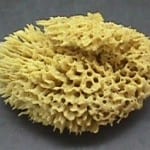Question of the Week: What is an animal?
By Lisa, on 5 March 2014
I have been engaging with visitors to the Grant Museum of Zoology for almost two years and thought I had heard most of the unanswerable questions I was likely to be posed on a shift there by now. However, I must confess to being totally stumped when a visitor a few weeks ago approached me towards the end of the day and asked “Why is a sponge an animal?” and, after a pause…“What is an animal?”
Surrounded by skeletons, stuffed and wet specimens representing almost every family within the animal kingdom, unfortunately what the actual definition might be had never crossed my mind before! Deciding it would be best not to try and come up with my own version, I consulted Dean, the museum’s Learning and Access Officer who kindly rescued me. His response was that, in short, the criterion for defining an animal as far as a sponge is concerned is that sponges (unlike plants) are unable to make their own food, or as the Oxford Dictionary puts it: ‘synthesize organic molecules from inorganic ones’.
The full definition adds some further factors, suggesting that an animal is ‘a living organism which feeds on organic matter, typically having specialized sense organs and nervous system and able to respond rapidly to stimuli’. Sponges, however, whilst they do qualify as animals, fall short of this definition as they lack true organs. Instead they filter water through a central cavity in order to remove bacteria and other food particles to feed upon. Whilst not capable of photosynthesis themselves, some sponge species nevertheless can play host to photosynthesising microorganisms to produce food instead.
It was Grant whose work finally established that sponges were indeed animals, and he who named the phylum Porifera, from the Latin porifer meaning bearing pores. There are approximately 5 – 10,000 known species of sponge, including the species named in tribute of Grant by his contemporary John Fleming in 1828, the Grantia.
To find out more, see: http://www.ucl.ac.uk/museums/zoology/about/history
 Close
Close



